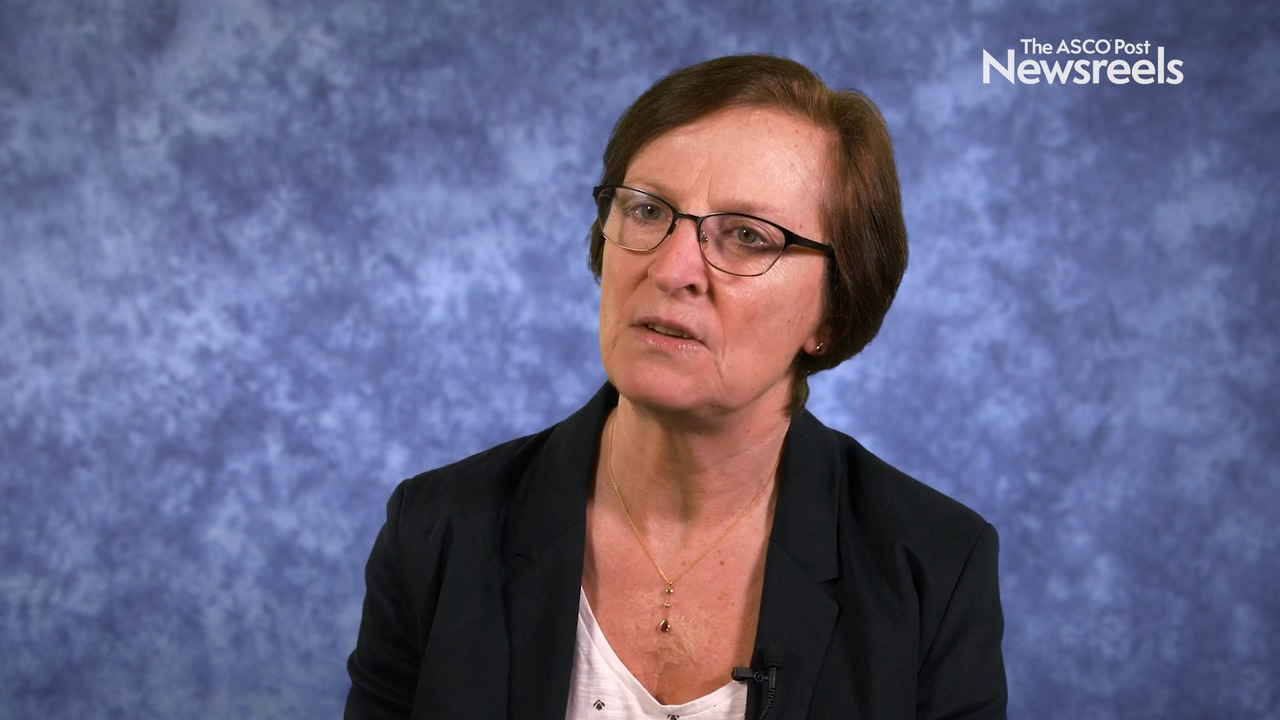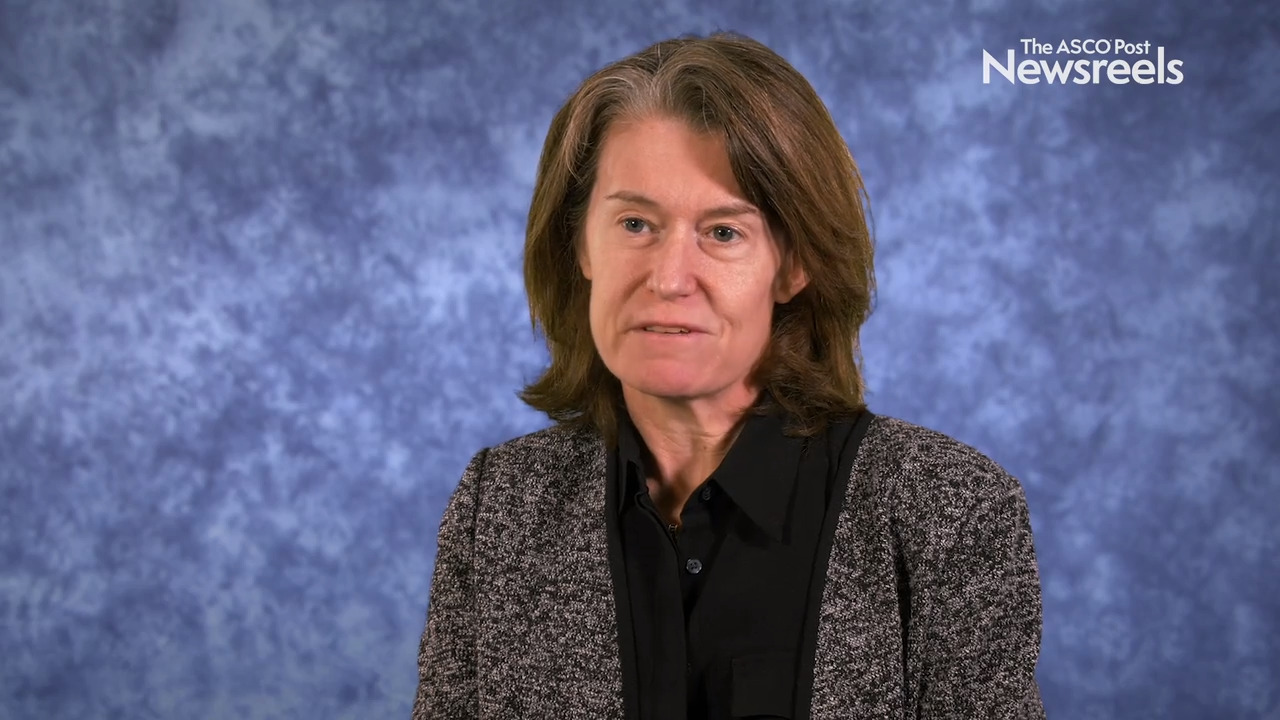Are There Racial Differences in Time to Treatment for Melanoma?
Black patients with stage I to III melanoma are likely to experience a longer delay from diagnosis to surgery than non-Hispanic white patients, according to a study published by Tripathi et al in the Journal of the American Academy of Dermatology. “We already knew that black patients with melanoma...
AACR 2020: Continuous vs Intermittent Dabrafenib/Trametinib Dosing in Patients With BRAF-Mutated Melanoma
A randomized clinical trial offers evidence that a combination of two targeted melanoma drugs, when given continuously, improves progression-free survival when compared with intermittent treatment, according to study results presented by Algazi et al at the American Association for Cancer Research...
Paolo A. Ascierto, MD, on Cancer Treatment During the COVID-19 Pandemic: The View From Southern Italy
Paolo A. Ascierto, MD, of the Istituto Nazionale Tumori in Naples, Italy, talks about minimizing risks for patients with cancer, prioritizing surgery and other treatments for melanoma, and the state of clinical trials. Filmed April 17, 2020.
What’s the Current Status of Neoadjuvant Immunotherapy?
For several tumor types, can the successes achieved with immunotherapy in the metastatic and adjuvant settings be replicated in the neoadjuvant setting? An explosion in clinical trials—with more than 300 listed on ClinicalTrials.gov—point to “yes.” “The neoadjuvant use of immunotherapy is of great ...
Differences in Melanoma Incidence in Men vs Women by Age and Anatomic Site
In a study published by Olsen et al in JAMA Dermatology, researchers found that in predominantly fair-skinned populations, melanoma incidence differed by age and anatomic site in men and women. Methods A cross-sectional analysis of sex- and site-specific trends was performed for white patients...
Expert Point of View: Jarushka Naidoo, MBBCh
Discussant of the abstract on antibiotic exposure, Jarushka Naidoo, MBBCh, Assistant Professor of Oncology and Attending Physician at the Sidney Kimmel Cancer Center at Johns Hopkins University, said that Mr. Chu and colleagues have added to the recent literature examining concurrent use of...
Prior Antibiotic Use Linked to Poorer Survival in Patients With Advanced Melanoma Receiving Immune Checkpoint Inhibitors
Treatment with antibiotics prior to immune checkpoint inhibitor therapy may confer poorer overall survival and an increased risk of colitis in patients with advanced melanoma, according to data presented at the 2020 ASCO-SITC Clinical Immuno-Oncology Symposium.1 The largest institutional...
Clinical and Dermoscopic Features of Uncommon Melanoma Variants: Systematic Review
In a literature review published by Pampena et al in JAMA Dermatology, researchers provided detailed and extensive information about the features of several different kinds of rare cutaneous melanomas. According to the researchers, the analysis was performed to “…provide a comprehensive overview of ...
Trends in Deaths From Cutaneous Melanoma in the United States
Recent treatment advances in metastatic melanoma resulted in reductions in population-level mortality from the disease, according to a study published by Polsky et al in the American Journal of Public Health. Methods Researchers analyzed new cases and deaths from melanoma from nine U.S....
Are Those Who Have Lost a Partner at a Higher Risk of Dying of Melanoma?
Individuals who experience the loss of a partner are less likely to be diagnosed with melanoma—but face an increased risk of dying from the disease, according to research published by Wong et al in the British Journal of Dermatology. While previous studies have suggested a link between various...
Long-Term Outcomes With PD-1 Inhibitor Treatment and Response to Retreatment in Advanced Melanoma
In a single-center study reported in the Journal of Clinical Oncology, Allison Betof Warner, MD, PhD, and colleagues found that approximately three-quarters of patients with advanced melanoma achieving a complete response on programmed cell death protein 1 (PD-1) inhibitor therapy were alive...
States With Highest Rates of Cutaneous Melanoma Due to Ultraviolet Exposure
A new study found a wide state-by-state variation in rates of melanoma caused by ultraviolet (UV) exposure, with highest rates in several states on the east and west coasts (including Hawaii), but also a few landlocked states (including Utah, Vermont, and Minnesota). The report, published by Islami ...
John N. Lukens, MD, on Advanced Melanoma: Antibiotics, Survival, and Colitis in Patients Receiving Immunotherapy
John N. Lukens, MD, of the Hospital of the University of Pennsylvania, discusses his finding that taking antibiotics within 3 months of starting treatment with immune checkpoint inhibitors may lead to inferior overall survival in patients with stage III or IV melanoma. The antibiotics were also linked to a higher incidence of severe immune-mediated colitis (Abstract 56).
Kevin Tyan on Colitis Induced by Immune Checkpoint Inhibitors: Potential Preventive Strategy
Kevin Tyan, of Kinnos, and currently a medical school student at Harvard University, discusses his study findings, which showed that patients with melanoma who are treated with immunotherapy had a significantly lower risk of developing colitis if they also took vitamin D ( Abstract 89).
Philippa G. Corrie, PhD, on Patient Outcomes in Melanoma After Immune Checkpoint Inhibition
Philippa G. Corrie, PhD, of Cambridge University Hospitals NHS Foundation Trust, discusses a review of 2,322 patients with metastatic melanoma receiving first-line immune checkpoint inhibitors as standard of care in England between 2014 and 2018 (Abstract 55).
Elizabeth A. Mittendorf, MD, PhD, on Mobilizing the Immune System to Treat Select Solid Tumors
Elizabeth A. Mittendorf, MD, PhD, of Dana-Farber Cancer Institute and Brigham and Women’s Hospital, summarizes a session she co-chaired on utilizing the immune system in neoadjuvant trials to treat melanoma, breast, and lung cancers.
Do Gay and Bisexual Men Have an Increased Risk of Developing Skin Cancer?
In the largest study to date of skin cancer rates among individuals who identify as gay, lesbian, or bisexual, investigators from Brigham and Women's Hospital reported important differences in skin cancer prevalence among sexual minorities. Rates of skin cancer were higher among gay and bisexual...
Biomarker Analysis in the COMBI-AD Trial of Adjuvant Dabrafenib Plus Trametinib in BRAF V600–Mutant Stage III Melanoma
In an exploratory biomarker analysis from the COMBI-AD trial, reported in The Lancet Oncology, Dummer et al found that tumor mutational burden (TMB) and interferon-gamma gene-signature profiles might be associated with an augmented benefit of adjuvant dabrafenib plus trametinib in resected BRAF...
Circulating Tumor Cell Assessment to Predict Melanoma Relapse
A study published by Anthony Lucci, MD, and colleagues in Clinical Cancer Research showed that the presence of circulating tumor cells was independently associated with relapse of melanoma, suggesting circulating tumor cell assessment may be a useful tool for identifying patients at risk for...
Risk of CNS Metastasis in Patients With AJCC 8th Edition Stage III Melanoma
A study using data from two major melanoma centers in the United States and Australia, reported in the Journal of Clinical Oncology by Haydu et al, has shown a 5-year cumulative incidence of central nervous system (CNS) metastasis of 15.8% among patients with American Joint Committee on Cancer...
Obstacles to Early Detection of Skin Cancer in Patients Living in Rural Western States
Residents of rural, sparsely populated “frontier counties” in the western United States have a higher incidence of skin cancer and related mortality rates. New research published by Jensen et al in Psychology, Health & Medicine indicated that the biggest obstacle to early detection and...
Cemiplimab in Locally Advanced Cutaneous Squamous Cell Carcinoma
As reported in The Lancet Oncology by Migden et al, a phase II trial has shown activity of cemiplimab in patients with locally advanced cutaneous squamous cell carcinoma. The trial supported the September 2018 U.S. Food and Drug Administration approval of cemiplimab in this setting. In this report, ...
Using T-Cell Fraction to Predict Melanoma Recurrence
In a paper published by Pruessmann et al in Nature Cancer, investigators presented a new, quantitative technique that leverages DNA sequencing to make more sophisticated and accurate predictions about which primary melanomas are likely to recur and spread. "As recently as 10 years ago, the outlook...
Immune-Related Adverse Events and Recurrence-Free Survival With Adjuvant Immunotherapy vs Placebo in Stage III Melanoma
In an analysis of the EORTC 1325/KEYNOTE-054 trial of adjuvant pembrolizumab vs placebo in stage III melanoma reported in JAMA Oncology, Alexander M.M. Eggermont, MD, PhD, and colleagues found that patients treated with pembrolizumab who experienced immune-related adverse events had improved...
Three Studies Examine Relationship Between B-Cell Enrichment and Response to Immunotherapy
The likelihood of a patient responding to immune checkpoint blockade may depend on B cells in the tumor, located within specialized immune-cell clusters known as tertiary lymphoid structures, according to three studies all recently published in Nature. The studies showed that enrichment of B cells...
Different Doses of Adjuvant Ipilimumab vs High-Dose Interferon Alfa-2b in Patients With Resected High-Risk Melanoma
As reported in the Journal of Clinical Oncology by Tarhini et al, the phase III Intergroup E1609 trial has shown an overall survival advantage with adjuvant ipilimumab at 3 mg/kg—but not at 10 mg/kg—vs high-dose interferon alfa-2b in patients with resected high-risk cutaneous melanoma. The...
Molecular Characteristics of Leptomeningeal Melanoma Metastases
Patients with advanced melanoma who develop metastases in the leptomeninges usually have a poor prognosis—most patients only survive for 8 to 10 weeks after diagnosis. One reason for this poor prognosis is that very little is known about the molecular development of leptomeningeal melanoma...
Does Weight-Loss Surgery Lower the Risk of Malignant Melanoma?
Bariatric surgery is associated with a distinct reduction in skin cancer risk, according to findings published by Taube et al in JAMA Dermatology. This finding further substantiates the connection between weight loss and malignant skin cancer. “This [study] provides further evidence for a...
Pembrolizumab in Adjuvant Treatment of Melanoma With Involvement of Lymph Nodes After Complete Resection
In early 2019, pembrolizumab was approved for the adjuvant treatment of patients with melanoma with involvement of lymph node(s) following complete resection.1,2 Supporting Efficacy Data Approval was based on findings in the double-blind EORTC 1325/KEYNOTE-054 trial (ClinicalTrials.gov identifier...
ACCC Project Focuses on Multidisciplinary Care of Cutaneous Squamous Cell Carcinoma
Due to the rarity of advanced cutaneous squamous cell carcinoma, staying current with the latest information on diagnosing, treating, and supporting patients with this diagnosis can be challenging for clinicians who do not often encounter it in practice. To support the multi-disciplinary cancer...
ASTRO Issues Clinical Guideline on Radiation Therapy for Basal Cell and Cutaneous Squamous Cell Carcinomas
A new clinical guideline from the American Society for Radiation Oncology (ASTRO) provides recommendations on the use of radiation therapy to treat patients diagnosed with the most common types of skin cancers. The guideline details when radiation treatments are appropriate as stand-alone therapy...
ACCC Project Focuses on Multidisciplinary Care of Cutaneous Squamous Cell Carcinoma
Due to the rarity of advanced cutaneous squamous cell carcinoma, staying current with the latest information on diagnosing, treating, and supporting patients with this diagnosis can be challenging for clinicians who do not often encounter it in practice. To support the multidisciplinary cancer team ...
RSNA 2019: High-Dose Brachytherapy for Older Patients With Nonmelanoma Skin Cancer
High-dose brachytherapy for elderly patients with nonmelanoma skin cancer produces excellent cure rates and cosmetic outcomes, according to a new study presented at the 2019 annual meeting of the Radiological Society of North America (RSNA) (Abstract SSM24-02). “For elderly patients [with...
Updated Data From Clinical Trials on Nivolumab/Ipilimumab in Advanced Melanoma
More than one out of two patients with metastatic melanoma treated with the combination of nivolumab plus ipilimu-mab is still alive after 5 years, according to the longest follow-up of patients receiving this combination. In two additional studies, the immunotherapy duet also proved to be active...
MicroRNA Panel Could Aid in the Detection of Uveal Melanoma
A blood test could soon become a monitoring tool for the early detection of uveal melanoma. Stark et al discovered markers in the blood that can differentiate between a benign mole and a melanoma, while also determining whether the cancer has metastasized, according to findings they published in...
Long-Term Analysis of Vemurafenib/Cobimetinib in Patients With BRAF-Mutated Melanoma
A phase Ib study evaluating the safety and long-term benefit of combination treatment with the BRAF inhibitor vemurafenib plus the MEK1 inhibitor cobimetinib in patients with advanced BRAF V600E–mutated melanoma has found that nearly 40% of the patients experienced extended survival of 4 to 5 years ...
Role of Voriconazole in Cutaneous Squamous Cell Carcinoma Development
For the last decade, medical experts have known that voriconazole—an antifungal medication used to prevent infections in patients with compromised immune systems—is linked to the development of particularly aggressive squamous cell carcinoma in skin exposed to ultraviolet (UV) rays. However, the...
Reflections on Long-Term Outcomes With BRAF/MEK Inhibition in Advanced Melanoma
For the treatment of BRAF V600-mutated advanced melanoma, we now have three BRAF/MEK inhibitor combinations that are approved by the U.S. Food and Drug Administration: dabrafenib/trametinib, vemurafenib/cobimetinib, and encorafenib/binimetinib. Although the toxicity profiles for these combinations ...
5-Year Efficacy Outcomes With Dabrafenib Plus Trametinib in BRAF-Mutated Metastatic Melanoma
As reported in The New England Journal of Medicine by Caroline Robert, MD, PhD, of the Institut Gustave Roussy and Paris-Sud-Paris-Saclay University, Villejuif, and colleagues, the long-term follow-up of the phase III COMBI-d and COMBI-v trials has shown a pooled 5-year overall survival rate of 34% ...
Head and Neck Melanoma in Adolescents and Young Adults: 1995 to 2014
Head and neck melanoma appears to be on the rise in young people in the United States and Canada, according to a study by Nosayaba Osazuwa-Peters, BDS, PhD, MPH, CHES, of the Saint Louis University (SLU) School of Medicine, and colleagues. Because the prognosis of head and neck melanoma is...
Relapse-Free Survival After Vismodegib Discontinuation in Patients With Complete Remission of Locally Advanced Basal Cell Carcinoma
In a French retrospective study reported in the Journal of Clinical Oncology, Herms et al found that long-term response is frequently maintained in patients discontinuing vismodegib after complete remission of locally advanced basal cell carcinoma, and that responses can be achieved with vismodegib ...
Long-Term Survival Outcomes With New Treatments for Advanced Melanoma: Questions Still in Need of Answers
The major treatment advances for melanoma can be attributed to anti–-cytotoxic T-lymphocyte–associated protein 4 (anti–CTLA-4; ipilimumab) and anti–programmed cell death protein 1 (anti–PD-1; nivolumab, pembrolizumab) immune checkpoint inhibitors and the combination of BRAF and MEK inhibitors...
Two New $1 Million Research Grants Focus on Metastasis of Melanoma
The American Cancer Society and Melanoma Research Alliance have selected two new promising projects in a second round of funding under a partnership between the two organizations. The first grants funded through the partnership, in 2018, focused on advancing research to reduce side effects...
5-Year Follow-up of KEYNOTE-006 Trial of Pembrolizumab vs Ipilimumab in Advanced Melanoma
In a post hoc 5-year follow-up of the KEYNOTE-006 trial reported in The Lancet Oncology, Caroline Robert, MD, of Institut Gustave Roussy, Université Paris-Sud, and colleagues found that pembrolizumab maintained overall and progression-free survival benefits over ipilimumab in advanced melanoma.1 In ...
No Survival Benefit With Complete Lymph Node Dissection vs Observation in Sentinel Node–Positive Melanoma
As reported by Leiter et al in the Journal of Clinical Oncology, the final analysis of the German phase III DeCOG-SLT trial have shown no distant metastasis-free survival, recurrence-free survival, or overall survival benefit with complete lymph node dissection vs observation in patients with...
BRAF and MEK Inhibition in Advanced Melanoma With Rare BRAF Mutations
In a study reported in the Journal of Clinical Oncology, Menzer et al found that combined BRAF/MEK inhibitor therapy appeared to be more active than single-inhibitor therapy in advanced melanoma with rare BRAF mutations. Study Details The study involved data from 103 patients with advanced melanoma ...
Whole-Brain Radiation Therapy vs Observation After Local Treatment of Melanoma Brain Metastases
In a phase III trial reported in the Journal of Clinical Oncology, Hong et al found that adjuvant whole-brain radiotherapy (WBRT) was not associated with a significant benefit in distant intracranial control vs observation after local treatment of patients with one to three melanoma brain...
Association Between Cutaneous Squamous Cell Carcinoma Risk and Indoor Tanning Use in Women
In a Norwegian study published by Lergenmuller et al in JAMA Dermatology, researchers found evidence of a dose-response association between lifetime indoor tanning and risk of development of cutaneous squamous cell carcinoma in women. The association was the same regardless of duration of use and...
Pembrolizumab for Relapsed or Refractory Mycosis Fungoides and Sézary Syndrome
In a phase II study reported in the Journal of Clinical Oncology, Khodadoust et al found that pembrolizumab was active in patients with advanced relapsed or refractory mycosis fungoides or Sézary syndrome. In the U.S.-based multicenter trial, 24 patients with advanced mycosis fungoides (n = 9) or...
FDA Pipeline: Advances in Prostate Cancer, Urothelial Cancer, Myelofibrosis, and More
In the past few weeks, the U.S. Food and Drug Administration (FDA) has issued regulatory decisions in prostate cancer, urothelial cancer, myelofibrosis, breast cancer, pediatric brain cancer, leukemia, and skin cancer. Breakthrough Therapy Designation for Niraparib in Metastatic...





